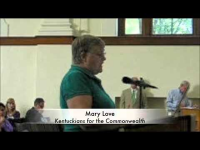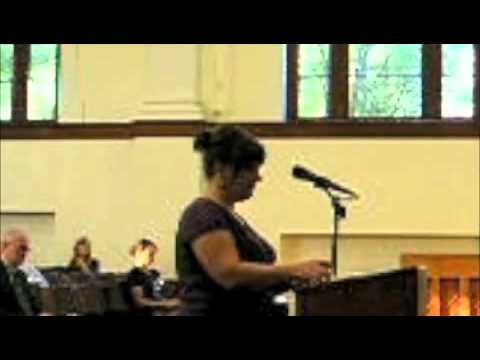Louisville KFTC members speak out at Tax Commission hearing

Members of KFTC and allied groups in Jefferson and surrounding counties voiced their opinions and suggestions for reforming Kentucky’s tax code at the Blue Ribbon Tax Commission public hearing Tuesday.
Molly Tevisorona, a new member, explained to the commission Kentucky’s need for a state earned income tax credit. “Food, housing and healthcare – Kentuckians deserve these things,” she said, and a state EITC can help meet those needs. Tevisorona described her own struggle to pay for her basic needs. “A little bit of extra money goes a long way for someone in my situation.”
An earned income tax credit can enhance people’s economic security and help lift them and their families out of poverty by providing them with a little extra money. KFTC supports legislation to create a state EITC at 15% of the federal credit.
Tevisorona suggested that an EITC could be paid for by taxing select services that other states already tax.
Many speakers throughout the evening focused on the need to fully fund healthcare and education, particularly in regards to those with low incomes. Linda Stettenbenz, a KFTC member, explained how she qualified for financial aid from the state to earn her college degree but never received it because the state ran out of money. This has happened numerous times to thousands of students, she said.
Stettenbenz pointed out that most new jobs will require at least two years of college, but asked what we are doing to support that growing need. “We have to provide equal opportunities,” she said.
 Instead of cutting funding for essential programs, the state should bring more fairness to the tax structure and demand accountability from companies to avoid tax loopholes, she said. Stettenbenz also emphasized the EITC, stating that 300,000 low-income Kentuckians could be helped through this program.
Instead of cutting funding for essential programs, the state should bring more fairness to the tax structure and demand accountability from companies to avoid tax loopholes, she said. Stettenbenz also emphasized the EITC, stating that 300,000 low-income Kentuckians could be helped through this program.
Sister of Charity Joetta Venneman and Mercy Sister Mary Schmuck also spoke to the needs of lower income Kentuckians. Although many nonprofit centers work to help those in need, Venneman explained that is not enough. “The nonprofit sector simply cannot make up for the state’s part in society; we need everybody to carry their fair share,” she said. The sisters said taxes should be based on people’s ability to pay and should seek to meet the needs of all, particularly those living in poverty.
Mary Love, a member of KFTC, described her personal experience based on her income. “Owing money to the state every year can cause last minute scrambling to come up with needed funds,” she said. Based on our current tax system, Kentuckians in lower income brackets are paying a higher percent of their incomes in state and local taxes than those in higher income brackets.
Love was the first speaker to mention the coal industry, which is a drain in the state’s budget. She pointed out that the coal industry costs the state $115 million more each year through direct and indirect subsidies than it receives from direct and indirect tax revenue generated by the industry.
Click these links to watch the videos of Mary Love and Linda Stettenbenz speaking at the tax hearing. Sarah Lynn Cunningham of the Louisville Climate Action Network expanded on Love’s description. She said that despite the industry’s efforts to advertise its benefits to the public, “we lose much more,” she said.
Cunningham described how she received less of a tax break for the solar panels on her home than coal companies do for mining coal. She explained that the tax code ought to be neutral and should not favor a dirty industry over energy efficiency. “Coal is not going to be the king for much longer,” Cunningham said.
About 30 other speakers presented a variety of ideas for the commissioners to consider. They included increasing the sales tax, doing away with personal and corporate incomes taxes, making the income tax system more progressive, removing the limit on property tax revenue growth, keeping the limit on property tax revenue growth, taking action to encourage home ownership, increasing the cigarette tax, and extending the sales tax to food in order to pay for eliminating the income tax on executive salaries.
Two men who are retired said they and their wives have generous pension income yet pay no income tax at all. They thought this was unfair to other Kentuckians as said they should be taxed.
The Louisville hearing was the third of six meetings being held throughout the state to allow citizens to give their recommendations to the commission, whose purpose is to evaluate and change Kentucky’s tax code. The next meeting will take place at Northern Kentucky University on Tuesday, July 24 from 6-8 p.m. in the Student Union Ballroom (20 Kenton Drive, Highland Heights).
Recent News
Kentucky’s past legislative session showed alarming trend toward government secrecy
Churchill Downs takes more than it gives. That's why the Kentucky Derby is a no-go for me
‘We must never forget.’ Kentucky town installs markers for lynching victims.
Featured Posts
TJC Rolling Out The Vote Tour – a KFTC Reflection Essay
KFTC Voter Empowerment Contractor Reflection Essay
Voting is Power
Archives
- Home
- |
- Sitemap
- |
- Get Involved
- |
- Privacy Policy
- |
- Press
- |
- About
- |
- Bill Tracker
- |
- Contact
- |
- Links
- |
- RSS


Add new comment